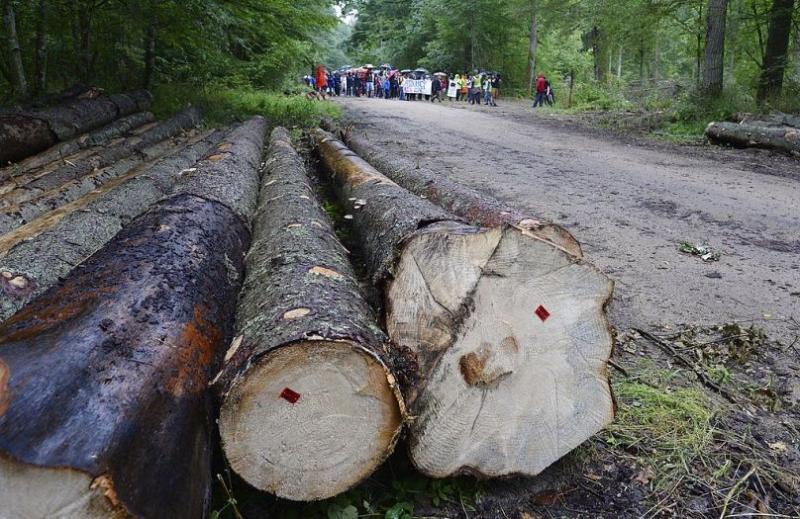The EU Deforestation Law should not be yet another false dawn
We must use this unique opportunity to tackle climate change, help stop the destruction of our remaining rainforests, and protect indigenous peoples and local communities depending on them, Anke Schulmeister writes.
Today, 29 June 2023, is a generation-defining day when the EU starts taking real action to shoulder its responsibility to protect forests.
This Thursday, the EU Deforestation Law enters into force, bringing with it a renewed sense of hope for the future of our planet.
The EU is a driving force behind forest and ecosystem destruction around the world.
In 2017 alone, EU consumption of key products and commodities such as soy, palm oil, beef and cocoa, was responsible for 16% of deforestation associated with international trade, leading to the destruction of 203,000 hectares - an area bigger than the size of London.
But with this law, the EU can become a force for good and turn the tide.
Prior laws plagued by insufficient checks
Of course, there are no guarantees about whether the new legislation, which was supported by hundreds of NGOs and 1.2 million people, will achieve its goal.
EU member states have committed to making companies follow new rules and keeping deforestation off the European market, but what will happen in practice may be a different story.
- MEPs shocked by logging threat to Romania's ancient woodlands
- European Parliament approves law ensuring EU products are deforestation-free
Let’s remember for a moment the EU Timber Regulation (EUTR), which was adopted in 2013 as a landmark piece of legislation to stop illegal logging and reduce illegal timber trade, but never fully implemented.
At times, those breaking the law would get a warning letter at most, giving them no incentive to change their ways.People take part in a protest against large-scale government logging in the Bialowieza Forest, Poland, August 2017AP Photo/Czarek SokolowskiInsufficient checks in some EU countries meant that companies could disregard the rules and operate freely without any real threat of prosecution.
At times, those breaking the law would get a warning letter at most, giving them no incentive to change their ways.
Such poor implementation and enforcement led the promising EUTR to fail in its mission, and the same could happen to the EU Deforestation Law.
A breach of the law is a breach of the law, full stop
As of today, large and medium-sized companies will have 18 months to get up to speed and make their supply chains deforestation-free, while smaller enterprises will be afforded 24 months.
- Indigenous groups offered mediation in French supermarket deforestation dispute
- EU reaches deal to ban products linked to deforestation
Once this time is up, the law must bite with its full force — without any excuses or exceptions.
Civil society organisations from across Europe and beyond are rallying once again to make sure history doesn’t repeat itself.
This time around, there needs to be real prosecution: no more trial periods or friendly reminders, only real action.Greenpeace activists stage a protest against the deforestation outside of the European Parliament in Strasbourg, September 2022AP Photo/Jean-Francois BadiasLet’s make things clear: a breach of the law should be treated as such and punished — getting away with a warning letter should no longer be an option.
This will not only encourage more companies to abide by the rules but also ensure transparency and fair competition for business — not to mention it will protect nature, our ticket to social and economic prosperity.
This time around, there needs to be real prosecution: no more trial periods or friendly reminders, only real action.
This is a new chapter for the planet — let's make sure it does what it promises to do
This also brings us to the issue of resources: one cannot implement the law without people to enforce it.
Member states must ensure enough and well-trained staff can carry out checks at the national level on products — not only those imported into Europe but also those made within our borders.
Today marks the beginning of a new chapter and a win for the planet — it should not be yet another false dawn.The Hallerbos forest south of Brussels, April 2022AP Photo/Olivier MatthysThe European market is vast, and the supply chain of a given product may encompass several countries before it reaches its final destination, so strong coordination between customs and enforcement authorities across the EU is essential to prevent any loopholes.
- Polish environmentalists protest as logging resumes in Bialowieza forest
- Energy crisis sees logging rules loosen in Hungary as protestors march in opposition
Today marks the beginning of a new chapter and a win for the planet — it should not be yet another false dawn.
We must use this unique opportunity to tackle climate change, help stop the destruction of our remaining rainforests, and protect indigenous peoples and local communities depending on them.
Member states, the ball is in your court.
Anke Schulmeister is the Senior Forest Policy Officer at WWF European Policy Office in Brussels.
At Euronews, we believe all views matter. Contact us at view@euronews.com to send pitches or submissions and be part of the conversation.
Share this article
- Share
- Tweet
- Share
- send
- Share
- Tweet
- Share
- send
- Share
- Send
- Share
- Share
- Share
- Send
- Share
- Share
You might also like
Tourism sector enjoying 'tremendous recovery', Brussels summit hears
The time has come to forge a more resilient relationship between the EU and China
Europe a 'fantastic' place to invent tourism AI, says Commissioner Breton
WWF EUROPEAN UNION DEFORESTATION CLIMATE CHANGE FORESTSHot Topic
Learn more about
climate changeمنبع خبر: یورو نیوز ![]()
اخبار مرتبط: The EU Deforestation Law should not be yet another false dawn
حق کپی © ۲۰۰۱-۲۰۲۴ - Sarkhat.com - درباره سرخط - آرشیو اخبار - جدول لیگ برتر ایران

